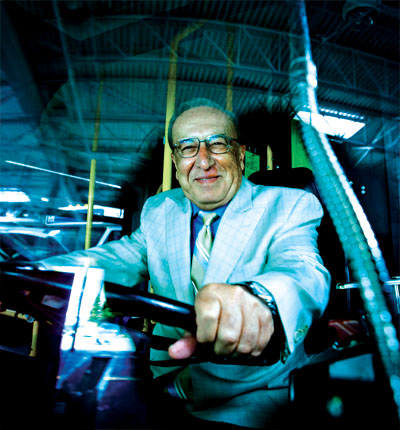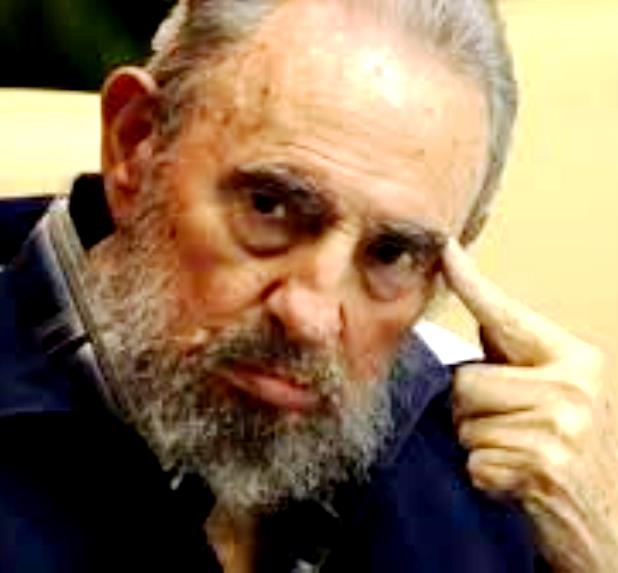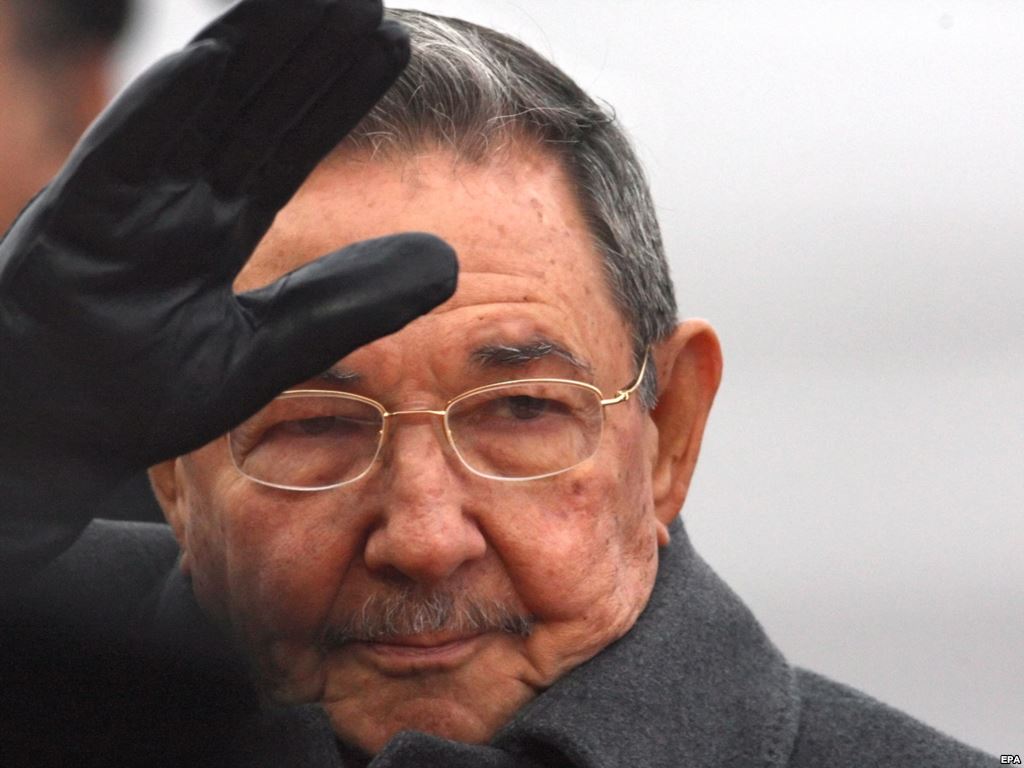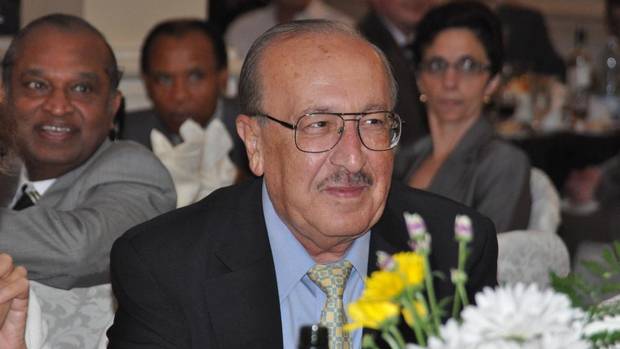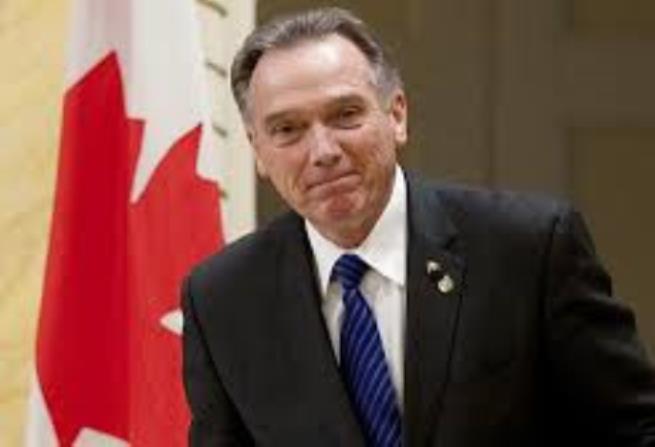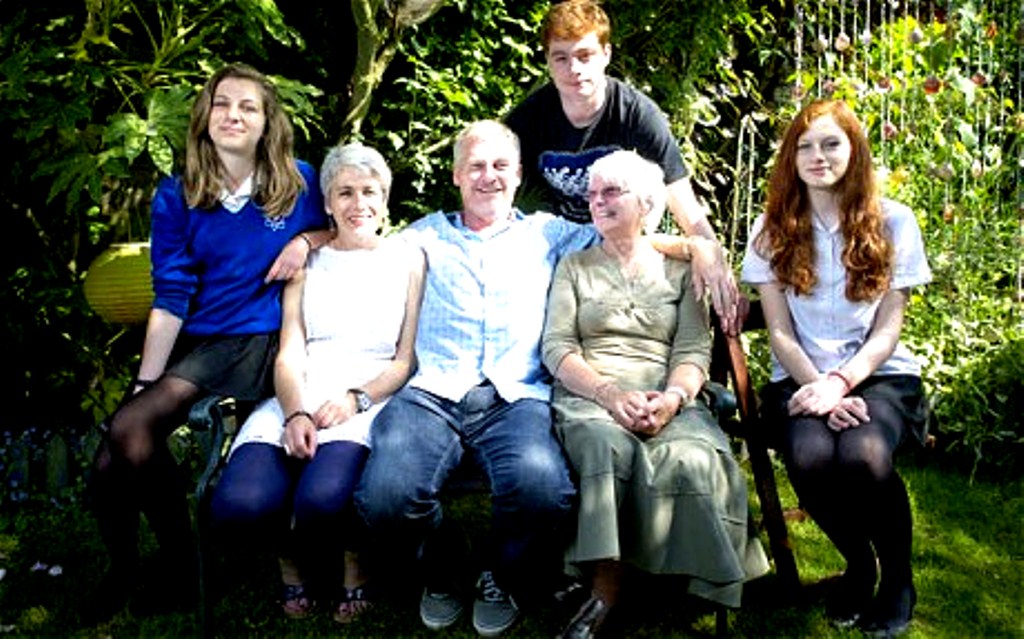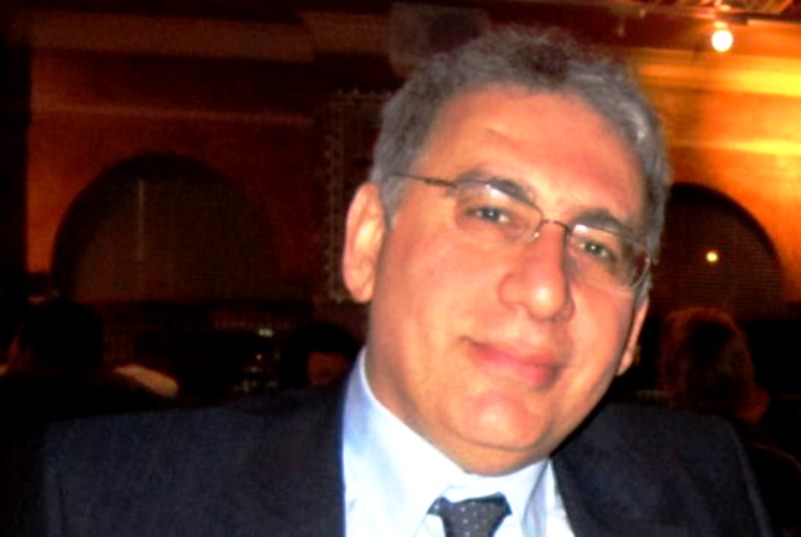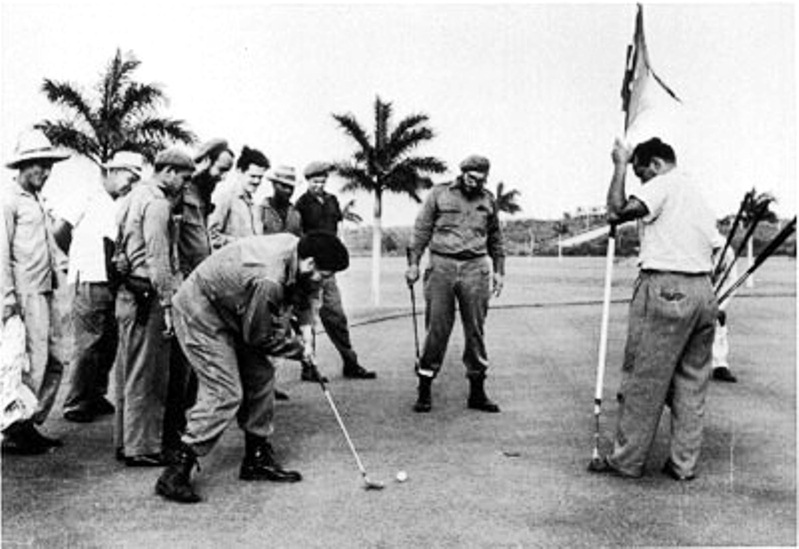“They’re taking benefits from the American taxpayer to subsidize their life in another country.”
Original Article Here: U.S. Welfare Flows to Cuba
By Sally Kestin, Megan O’Matz and John Maines with Tracey Eaton in Cuba
Orlando Sun-Sentinel, October 2, 2015
Read previous investigations into special treatment for Cuban immigrants
Cuban immigrants are cashing in on U.S. welfare and returning to the island, making a mockery of the decades-old premise that they are refugees fleeing persecution at home. Some stay for months at a time — and the U.S. government keeps paying.
Cubans’ unique access to food stamps, disability money and other welfare is meant to help them build new lives in America. Yet these days, it’s helping some finance their lives on the communist island.
America’s open-ended generosity has grown into an entitlement that exceeds $680 million a year and is exploited with ease. No agency tracks the scope of the abuse, but a Sun Sentinel investigation found evidence suggesting it is widespread.
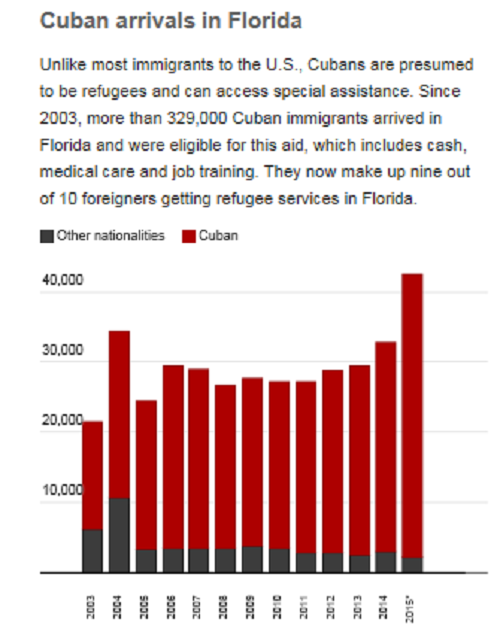
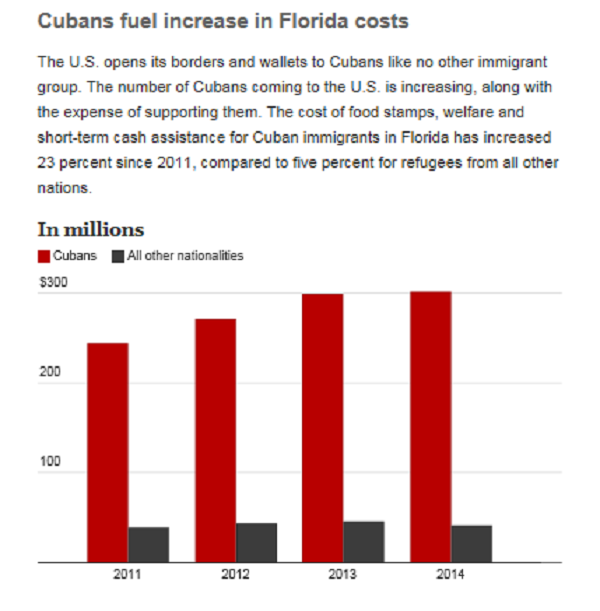
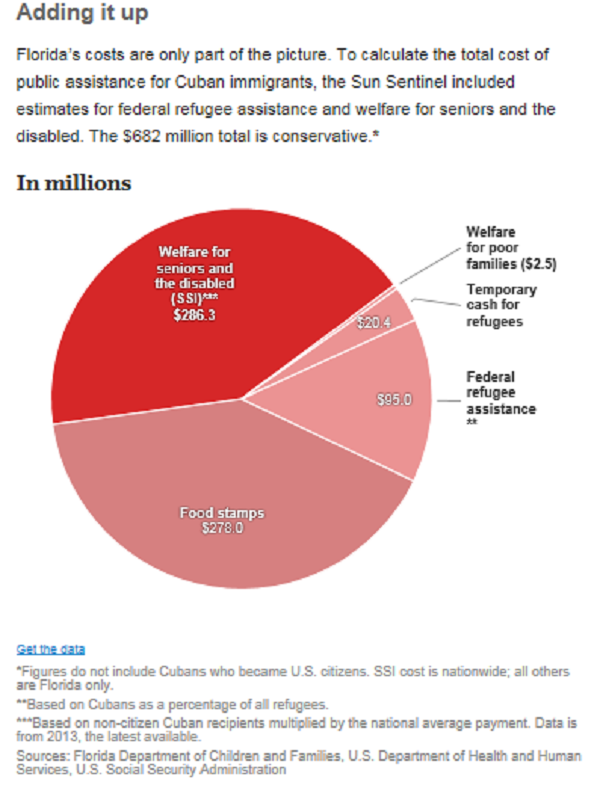
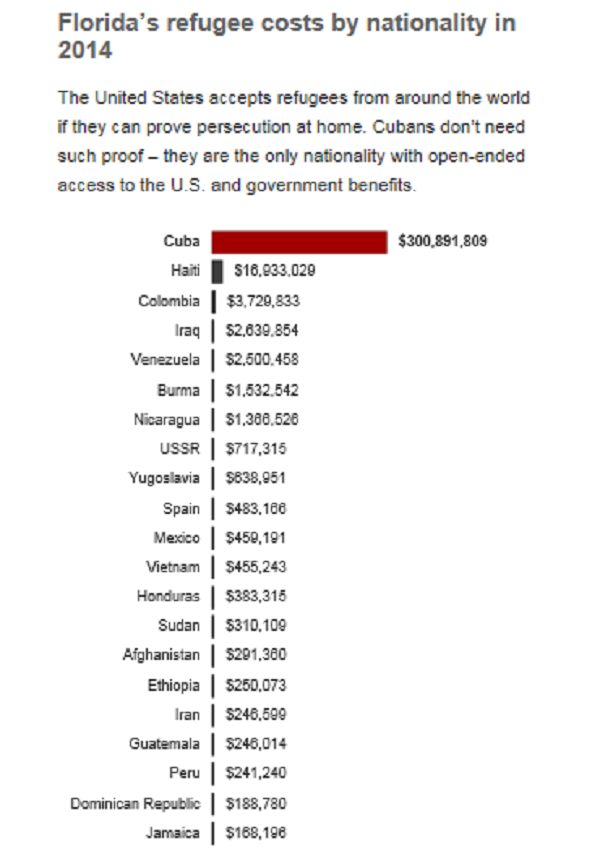
Cuban arrivals in Florida
Unlike most immigrants to the U.S., Cubans are presumed to be refugees and can access special assistance. Since 2003, more than 329,000 Cuban immigrants arrived in Florida and were eligible for this aid, which includes cash, medical care and job training. They now make up nine out of 10 foreigners getting refugee services in Florida.
Fed-up Floridians are reporting their neighbors and relatives for accepting government aid while shuttling back and forth to the island, selling goods in Cuba, and leaving their benefit cards in the U.S. for others to use while they are away.
Some don’t come back at all. The U.S. has continued to deposit welfare checks for as long as two years after the recipients moved back to Cuba for good, federal officials confirmed.
Regulations prohibit welfare recipients from collecting or using U.S. benefits in another country. But on the streets of Hialeah, the first stop for many new arrivals, shopkeepers like Miguel Veloso hear about it all the time.
Veloso, a barber who has been in the U.S. three years, said recent immigrants on welfare talk of spending considerable time in Cuba — six months there, two months here. “You come and go before benefits expire,” he said.
State Rep. Manny Diaz Jr. of Hialeah hears it too, from constituents in his heavily Cuban-American district, who tell of flaunting their aid money on visits to the island. The money, he said, “is definitely not to be used … to go have a great old time back in the country that was supposed to be oppressing you.”
The sense of entitlement is so ingrained that Cubans routinely complained to their local congressman about the challenge of accessing U.S. aid — from Cuba.
“A family member would come into our office and say another family member isn’t receiving his benefits,” said Javier Correoso, aide to former Miami Rep. David Rivera. “We’d say, ‘Where is he?’ They’d say, ‘He’s in Cuba and isn’t coming back for six months.’”
The money “is definitely not to be used … to go have a great old time back in the country that was supposed to be oppressing you.”
“They’re taking benefits from the American taxpayer to subsidize their life in another country.’”
One woman told Miami immigration attorney Grisel Ybarra that her grandmother and two great aunts came to Florida, got approved for benefits, opened bank accounts and returned to Cuba. Month after month, the woman cashed their government checks — about $2,400 each time — sending half to the women in Cuba and keeping the rest. When a welfare agency questioned the elderly ladies’ whereabouts this summer, the woman turned to Ybarra, a Cuban American. She told Ybarra her grandmother refused to come back, saying: “With the money you sent me, I bought a home and am really happy in Cuba.”
Cubans on the island, Ybarra said, have a name for U.S. aid. They call it “la ayuda.” The help.
Special status abused
Increasing openness and travel between the two countries have made the welfare entitlement harder to justify and easier to abuse. But few charges have been brought, and Congress and the Obama Administration have failed to address the problem even as the United States moves toward détente with Cuba.
Cubans fuel increase in Florida costs
The U.S. opens its borders and wallets to Cubans like no other immigrant group. The number of Cubans coming to the U.S. is increasing, along with the expense of supporting them. The cost of food stamps, welfare and short-term cash assistance for Cuban immigrants in Florida has increased 23 percent since 2011, compared to five percent for refugees from all other nations.
Adding it up
Florida’s costs are only part of the picture. To calculate the total cost of public assistance for Cuban immigrants, the Sun Sentinel included estimates for federal refugee assistance and welfare for seniors and the disabled. The $682 million total is conservative.*
Cubans’ extraordinary access to U.S. welfare rests on two pillars of special treatment: the ease with which they are admitted to the country, and America’s generosity in granting them public support.
Cubans are allowed into the U.S. even if they arrive without permission and are quickly granted permanent residency under the 1966 Cuban Adjustment Act. They’re assumed to be refugees without having to prove persecution.
They’re immediately eligible for welfare, food stamps, Medicaid and Supplemental Security Income or SSI, cash assistance for impoverished seniors and disabled younger people.
Most other immigrants are barred from collecting aid for their first five years. Those here illegally are not eligible at all.
The Sun Sentinel analyzed state and federal data to determine the annual cost of taxpayer support for Cuban immigrants: at least $680 million. In Florida alone, costs for welfare, food stamps and refugee cash have increased 23 percent since 2011, the last year data was available.
Not all Cubans receive government help. Those arriving on visas are ineligible, and some rely on family support. And many who receive aid do so for just a short time until they settle in, as the U.S. intended. Cubans over time have become one of the most successful immigrant groups in America.
“They come to the U.S. to work and make a living for their family,” said Jose Alvarez, a Cuba native and city commissioner in Kissimmee. “I don’t believe that they come thinking the government will support them.”
But some take advantage of the easy money — and then go back and forth to Cuba.
A public housing tenant in Hialeah, who was receiving food stamps and SSI payments for a disabled son, frequently traveled to Cuba to sell food there, records show. She admitted to a city housing investigator in 2012 that she “makes $700 in two months just in the sales to Cuba.”
Another man receiving food stamps admitted to state officials “that he was living in Cuba much of 2015.”
A recent arrival with a chronic illness got Medicaid coverage and turned to attorney David Batchelder of Miami to help him get SSI as well. But the man was “going back and forth to Cuba” so much that Batchelder eventually dropped the case. “It was just another benefit he was applying for.”
Concerns about Cubans exploiting the aid are especially troubling to exiles who came to this country decades ago and built new lives and careers here. Dr. Noel Fernandez recalls the assistance his family received from friends and the U.S. government when they immigrated 20 years ago, help that enabled him to find work as a landscaper, learn English and complete his medical studies. Now medical director of Citrus Health Network in Hialeah, Fernandez sees Cuban immigrants collecting benefits and going back, including three elderly patients who recently left the U.S. for good.
“They got Medicaid, they got everything, and they returned to Cuba,” he said. “I see people that said they were refugees [from] Cuba and they return the next year.”
State officials have received complaints about Cubans collecting aid while repeatedly going to Cuba or working as mules ferrying cash and goods, a common way of financing travel to the island.
Another way of paying for the trips: cheating. Like other welfare recipients, some Cubans work under the table or put assets in others’ names to appear poor enough to meet the programs’ income limits, according to records and interviews. Some married couples qualify for more money as single people by concealing marriages performed in Cuba, where the U.S. can’t access records.
Florida’s refugee costs by nationality in 2014
The United States accepts refugees from around the world if they can prove persecution at home. Cubans don’t need such proof – they are the only nationality with open-ended access to the U.S. and government benefits.
“Stop the fraud please!” one person urged in a complaint to the state. Another pleaded with authorities to check airport departure records for a woman suspected of hiding income. “It would show how many times she has traveled to Cuba.”
Florida officials typically dismissed the complaints for lack of information, because names didn’t match their records or because the allegations didn’t involve violations of eligibility rules. Travel abroad is not expressly prohibited, but benefits are supposed to be used for basic necessities within the U.S.
“Our congressional folks should be looking at this,” said Miami-Dade County Commissioner Esteban Bovo Jr., a Cuban American. “There could be millions and millions of dollars in fraud going on here.”
Money to Cuba
Accessing benefits from Cuba typically requires a U.S. bank account and a willing relative or friend stateside. Food stamps and welfare are issued monthly through a debit-type card, and SSI payments are deposited into a bank account or onto a MasterCard.
A joint account holder with a PIN number can withdraw the money and wire it to Cuba. Another option: entrust the money to a friend traveling to Cuba.
Roberto Pizano of Tampa, a political prisoner in Cuba for 18 years, said he worked two jobs when he arrived in the U.S. in 1979 and never accepted overnment help. He now sees immigrants “abusing the system.”
“I know people who come to the U.S., apply for SSI and never worked in the USA,” he said. They “move back to Cuba and are living off of the hard-earned taxpayer dollars.”
Roberto Pizano of Tampa, a political prisoner in Cuba for 18 years, said Cubans are signing up for U.S. benefits and moving back to Cuba, “living off of the hard-earned taxpayer dollars.“ Photo by Taimy Alvarez
Federal investigators have found the same scenario in other cases. A 2012 complaint alleged a 75-year-old woman had moved to Camaguey two years earlier and a relative was withdrawing her SSI money from a bank account and sending it to her. Social Security stopped payments, but not before nearly $16,000 had been deposited into her account.
Another recipient went to Cuba on vacation and stayed, leaving his debit card with a relative. Social Security continued his SSI payments for another six months — $4,000 total — before an anonymous caller reported he had gone back to Cuba.
One woman reportedly moved to Cuba in 2010 and died three years later, while still receiving SSI and food stamps, according to a 2014 tip to Florida welfare fraud investigators. A state official couldn’t find her at her Hialeah home, cut off the food stamps and alerted the federal government.
Former congressman Rivera tried to curb abuses with a bill that would have revoked the legal status of Cubans who returned to the island before they became citizens.
“Public assistance is meant to help Cuban refugees settle in the U.S.,” Mauricio Claver-Carone of Cuba Democracy Advocates testified in a 2012 hearing on the bill. “However, many non-refugee Cubans currently use these benefits, which can average more than $1,000 per month, to immediately travel back to the island, where the average income is $20 per month, and comfortably reside there for months at a time on the taxpayer’s dime.”
Rivera recently told the Sun Sentinel that he interviewed welfare workers, Cubans in Miami and passengers waiting for charter flights to Havana. He said he found overwhelming evidence of benefits money going back, especially after the U.S. eased travel restrictions in 2009.
The back and forth undermines the rationale that Cubans are refugees fleeing an oppressive government, Rivera said. And when they return for visits, they boast of the money that’s available in the U.S., he said. “They all say, ‘It’s great. I got free housing. I got free food. I get my medicine.’ ”
Five Cubans interviewed by the Sun Sentinel in Havana said they were aware of the assistance and knew of Cubans who had gone to America and quickly began sending money back. Two said they believed it was U.S. government aid.
“I don’t think it’s correct, but everyone does it for the well-being of their family,” said one woman, Susana, who declined to give her last name.
Outside welfare offices in Hialeah, the Sun Sentinel found Cuban immigrants who had arrived as recently as three days earlier, applying for benefits. They said family and friends told them about the aid before they left Cuba.
“Back in the ’60s, when you came in, they told you the factory that was hiring,” said Nidia Diaz of Miami, a former bail bondswoman who was born in Cuba. “Now, they tell you the closest Department of Children and Families [office] so you can go and apply.”
Crooks collect in Cuba
Miami bail bondswoman Barbara Pozo said many of her Cuban clients talk openly about living in Cuba and collecting monthly disability checks, courtesy of U.S. taxpayers. “They just come here to pick up the money,” Pozo said. “They pretend they’re disabled. They just pretend they’re crazy.” SSI payments, for those who cannot work due to mental or physical disabilities, go up to $733 a month for an individual. Most other new immigrants are ineligible until they become U.S. citizens.
Cubans collect, others don’t:
Some Cubans try to build a case for SSI by claiming trauma from their life under an oppressive government or the 90-mile crossing to Florida. Diaz, the former bondswoman, said she has heard Cuban clients talk about qualifying: “‘Tell them that you have emotional problems. How did you get these problems? Well, trying to get here from Cuba.’”
Antonio Comin collected disability while organizing missions to smuggle Cubans to Florida, including one launched from a house in the Keys, federal prosecutors said. Comin claimed he rented the home to celebrate his birthday — after receiving his government check.
Casimiro Martinez was receiving a monthly check for a mental disability — but his mind was sound enough to launder more than $1 million stolen from Medicare. Martinez was arrested at Miami International Airport after returning from a trip to Cuba.
Outside welfare offices in Hialeah, the Sun Sentinel found Cuban immigrants who had arrived as recently as three days earlier, applying for benefits.
Government disability programs are vulnerable to fraud, particularly SSI, with applicants faking or exaggerating symptoms. Some view SSI as “money waiting to be taken,” said John Webb, a federal prosecutor in Tennessee who has handled fraud cases.
While benefits are supposed to be suspended for recipients who leave the United States for more than 30 days, the government relies on people to self-report those absences, and federal audits have found widespread violations.
The government could significantly reduce abuses by matching international travel records to SSI payments, auditors have recommended since 2003. The Social Security Administration and Department of Homeland Security are still trying to work out a data sharing agreement — 12 years later.
Jose Caragol, a Hialeah city councilman and Havana native, said aid for Cubans “was meant to assist those who were persecuted and want a new life. The bleeding has to stop.”
 Raúl Castro, Miguel Díaz-Canel, Machado Ventura y Ramiro Valdés. (EFE)
Raúl Castro, Miguel Díaz-Canel, Machado Ventura y Ramiro Valdés. (EFE)




